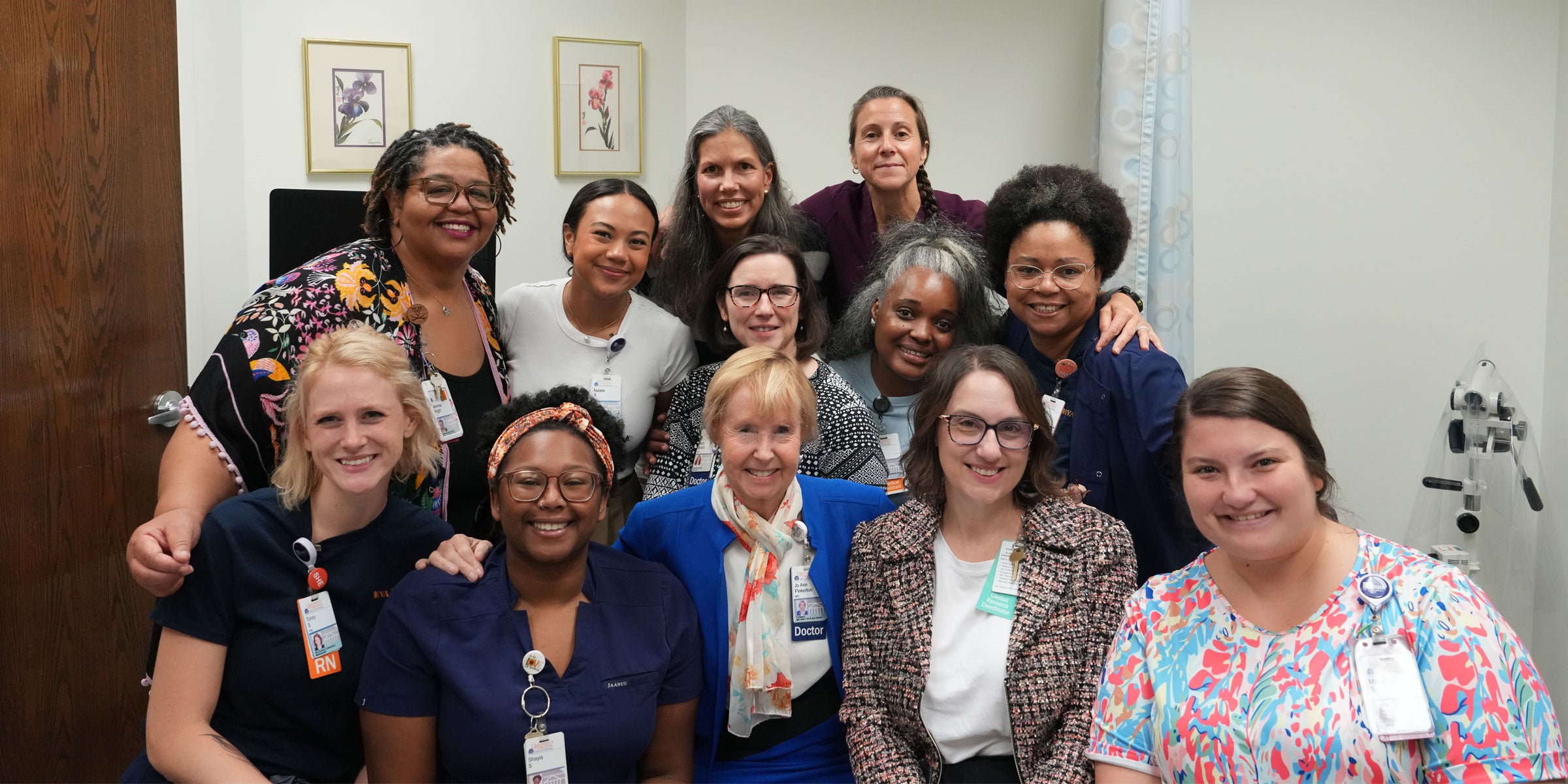
JoAnn Pinkerton, MD, (bottom row, center) and her elinzanetant research team (photo credit Harry Moxley)
JoAnn Pinkerton, MD, a professor of obstetrics and gynecology and director of the UVA Midlife Center, was the national lead and UVA site principal investigator for the international, randomized OASIS clinical trials, which examined the efficacy and safety of the drug elinzanetant to treat moderate to severe vasomotor symptoms due to menopause. Dr. Pinkerton was lead author on a research paper about OASIS 1 and 2 phases that was published in the Journal of the American Medical Association in August 2024. She is co-authoring a forthcoming research paper about the results of OASIS 3.
In her career as a clinical investigator, Dr. Pinkerton has published more than 174 peer-reviewed publications, 90 abstracts, 30 invited papers and 11 invited chapters. She has also served as principal investigator for over 30 clinical trials on treatment of vasomotor symptoms with hormonal and nonhormonal therapies. She is a fellow of American College of Obstetricians and Gynecologists and previously served as executive director of the The Menopause Society, a nonprofit organization focused on providing healthcare professionals the tools and resources to improve the health of women during the menopause transition and beyond.
Dr. Pinkerton sat down with us recently for our Medicine in Motion series “A Healthier Future — One Clinical Trial at a Time” to share more about her clinical research.
Q. What do you hope to from this study? Will the results potentially change the standard of care for future patients?
Pinkerton: Although all women go through menopause, less than 15% of them receive effective, individualized, evidence-based treatment for their symptoms.
Elinzanetant is a selective, nonhormonal dual neurokinin 1 (NK-1) and 3 (NK-3) receptor antagonist. It blocks NK-1 and NK-3 receptor signaling on kisspeptin/neurokinin B/dynorphin (KNDy) neurons in the hypothalamus, which are involved in regulating temperature and sleep pathways.
The OASIS 1 and 2 trials are pivotal phase 3 studies assessing the efficacy and safety of the investigational compound elinzanetant for the treatment of postmenopausal vasomotor symptoms, such as hot flashes and night sweats. The goal of the trials was to assess the effect of elinzanetant vs. placebo on vasomotor frequency and severity, sleep disturbance, and menopause-related quality of life using patient-reported outcomes.
Q. Does your trial give novel treatment or other opportunities to your/our patients?
Pinkerton: There is currently no effective nonhormone therapy that addresses the triad of vasomotor symptoms, sleep, and mood for symptomatic menopausal women.
What is exciting and novel about this trial is that elinzanetant is a non-estrogen therapy that appears highly effective at improving bothersome moderate-to-severe vasomotor symptoms. In addition, due to its dual receptor activity, elinzanetant improves sleep and mood, thus addressing the triad for symptomatic menopausal women.
Q. What is novel about your study design/treatment/intervention?
Pinkerton: Elinzanetant is the first dual receptor neurokinin being tested in phase 3 clinical trials. The University of Virginia, as one of the sites, plays a unique role because in addition to being a site for the trial, a UVA principal investigator serves as the lead investigator for the United States.
A significant aspect of this study is the inclusion of the “voice of women with menopause.” Their input was incorporated into the design of the OASIS studies through an advisory group, focus groups, interviews, and surveys. The women’s feedback was instrumental in shaping the trial’s protocol, making the endpoints relevant, and finding ways to reduce the burden of participation for women.
Q. How will you ensure inclusion of a diverse subject population?
Pinkerton: With 155 sites across the United States, the United Kingdom, and Europe, the OASIS trials will include women from different parts of our country and other countries. The trial is being advertised nationally to attract a diverse group of women including having locations within inner-city populations. The women who enroll in the trial receive free medication and needed health testing, which improves its value for diverse populations. Materials are available in Spanish if needed.
Q. What is the importance of this trial?
Pinkerton: Although hormone therapy is widely available to treat bothersome menopausal symptoms, not all women are candidates for hormone therapy or choose to take it. The need for effective nonhormone therapy for symptomatic menopausal women is urgent and significant, and this trial aims to address this need.
When you look at the populations of women who cannot or will not take hormone therapy, it is women that are at risk for or have had estrogen sensitive cancers such as breast or endometrial cancer. However, it also includes women who have had a heart attack, stroke, venous thrombosis, or migraines with aura. These are women who need help for their hot flashes, sleep, and mood, but there have not been effective treatments to date.
Read more in the UVA Health press release.
Filed Under: Research
